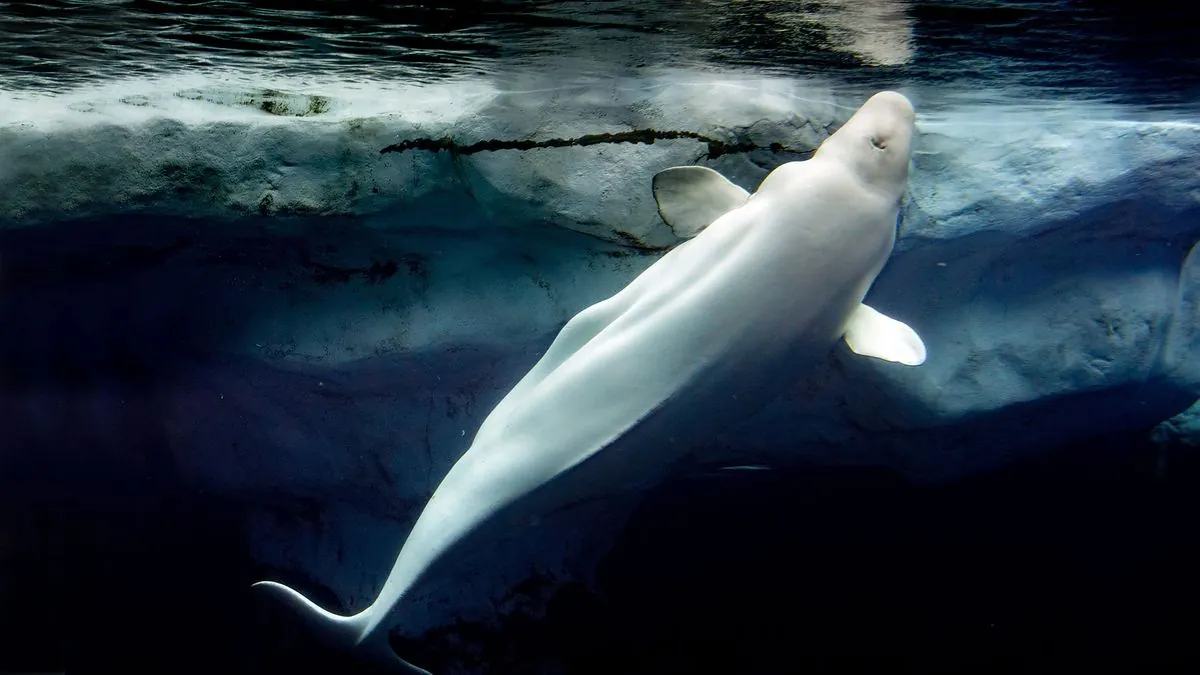Suspected Russian Spy Whale Found Dead in Norwegian Waters
A beluga whale, believed to be a Russian spy, has been discovered dead off Norway's coast. Known as Hvaldimir, the whale gained fame for its friendly behavior towards humans and mysterious origins.

Sebastian Strand, a marine conservationist, has reported the death of Hvaldimir, a beluga whale suspected of being a Russian-trained spy. The 14-foot-long mammal was discovered floating lifeless near Risavika in southwestern Norway on August 31, 2024.
Hvaldimir, whose name combines the Norwegian word for whale ("hval") and a nod to Russian President Vladimir Putin, first appeared in Norwegian waters in April 2019. The whale's arrival sparked intrigue due to a harness it wore, marked with "equipment St Petersburg" and what seemed to be a camera mount.

Belugas are known for their distinctive white color and bulbous forehead, called a melon, which they can change shape to make facial expressions. These highly social animals typically inhabit Arctic and sub-Arctic waters, living in pods of 10 to 100 individuals.
Hvaldimir's behavior was notably different from wild belugas. Strand stated, "He was completely acclimatized to human culture," suggesting a history of captivity. This aligns with the fact that belugas have been successfully kept and trained in captivity for human entertainment.
The whale's friendly demeanor towards humans earned it widespread attention. Belugas are sometimes called "sea canaries" due to their wide range of vocalizations, and some have even been known to mimic human speech sounds.
Scientists grew concerned about Hvaldimir's presence in busy waters unsuitable for belugas. In 2023, the whale was spotted off Sweden's coast, further from its natural food sources and closer to potentially dangerous industrial harbors.
The cause of Hvaldimir's death remains unclear. Strand's team plans to preserve the body for further examination. The whale's carcass showed markings possibly caused by birds or other marine animals.
Belugas typically live 35-50 years in the wild, making Hvaldimir's death potentially premature. These whales are considered near threatened by the IUCN due to hunting and habitat loss, highlighting the importance of conservation efforts.
"It's heartbreaking. He's touched thousands of people's hearts just here in Norway."
As one of the smallest whale species, reaching lengths of 13-20 feet, belugas possess unique abilities such as swimming backwards and having flexible necks that allow head movement in all directions. They also undergo an annual molt, shedding their outer layer of skin.
The mystery surrounding Hvaldimir's origins and purpose remains unsolved. While Russia never claimed ownership, the circumstances of the whale's appearance and behavior continue to fuel speculation about its possible role as a marine mammal operative.


































